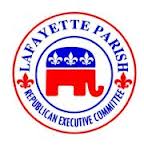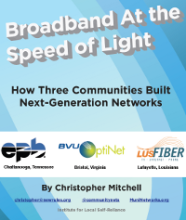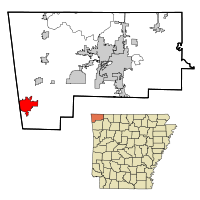Image


We, the members of the Lafayette Democratic Parish Executive Committee, believe the project will enhance businesses, enrich our lives, and prepare our children for the future. With proper planning, future generations will see profits generated by this project stay in this community and improve businesses and lives for generations to come. Improving local communities has been the traditional purpose of the Democratic Party. With that in mind, we commend City-Parish President Joey Durel for his bold initiative to make this plan a success.A few weeks later, the Lafayette Republican Party endorsed the network [pdf] as well:

...
It's an urban legend that the government launched the Internet. The myth is that the Pentagon created the Internet to keep its communications lines up even in a nuclear strike.Well, he was right about the nuclear strike bit. But the federal government played several important roles in the creation of the Internet, which truly was created by the efforts of many people, companies, and institutions. As evidence for his argument, Crovitz cites Dealers of Lightning by Michael Hiltzik. Unfortunately, Hiltzik disputed Crovitz's understanding of it:
And while I'm gratified in a sense that he cites my book about Xerox PARC, "Dealers of Lightning," to support his case, it's my duty to point out that he's wrong. My book bolsters, not contradicts, the argument that the Internet had its roots in the ARPANet, a government project. ... But Crovitz confuses AN internet with THE Internet. Taylor was citing a technical definition of "internet" in his statement. But I know Bob Taylor, Bob Taylor is a friend of mine, and I think I can say without fear of contradiction that he fully endorses the idea as a point of personal pride that the government-funded ARPANet was very much the precursor of the Internet as we know it today. Nor was ARPA's support "modest," as Crovitz contends. It was full-throated and total. Bob Taylor was the single most important figure in the history of the Internet, and he holds that stature because of his government role.CNET talked to Vint Cerf about the Crovitz claims. In reaction to a Crovitz claim that the government didn't understand the value of TCP/IP but the private sector did, Vint said:
I would happily fertilize my tomatoes with Crovitz' assertion.Nicely done.

David Cameron, city administrator, said the proposal is not so much about dissatisfaction with current providers as it is about finding new revenue for the city. Cameron said revenue from electric services has been a key source of funding for various projects and necessities for the city. That “enterprise” fund is getting smaller, Cameron said, and an alternative funding source is needed. “We have done a good job managing accounts, building a reserve,” Cameron said. “We want to keep building on the programs we have. It takes money and funds to do that.” City officials discussed the issue for the last 18 months and decided to put it to a referendum. Voters will decide the issue May 22.That is a fairly unique reason. Most communities want to build these networks to encourage economic development and other indirect benefits to the community. Given the challenge of building and operating networks, few set a primary goal of boosting city revenue.

If approved by voters, the city plans to spend $8.3 million to install 100 miles of fiber optic cable directly to homes and businesses. The city should be able to repay the debt in 12 years, if things go according to a feasibility study presented to the city’s board of directors in January.
The Coalition for the New Economy — which works to ensure “that investments in broadband networks are used efficiently and effectively”— wrote Tuesday that “funding for government-owned broadband networks is very often duplicative,” and “diverts local funds from public safety and education. ... Christopher Mitchell of Community Broadband Networks tells the Independent that official U.S. government policy believes “we can have proper competition if every competitor builds their own network, and that is not at all supported by reality.”This group is emphatically supporting less competition because the private sector does not want to overbuild other private networks. If the public is not allowed to build next-generation networks where private companies already operate last-generation networks, communities will have neither modern connections nor real choices. The cable and DSL companies are arguing that no one should be allowed to build public interstates where private dirt roads exist. We live in a democracy. We are supposed to be free to choose the best policies in promoting infrastructure. We can choose a future where we are more dependent on a few absentee massive corporations or one in which we have more control over our future. We can pursue policies that would result in real choices among broadband service providers or we can continue the status quo, where choices dwindle. Below, I have included an excellent debate from last year in which the above points are fleshed out over 2 hours.
A municipal government cannot possibly hope to compete with well-capitalized broadband providers in a highly competitive market.For those unfamiliar with Heartland, they don't use the same definitions for common words like "competitive" as the rest of us do. In Heartland's world, "competitive" means a market in which one of our funders operates regardless of how much competition exists in it. So why do we need new legislation to make it even harder for communities to build the networks that the cable and DSL companies won't build?
The battle over broadband in Lafayette is part of a growing number of clashes across the USA that pit municipalities against telecom firms for the right to deliver Web access to homes and businesses. More than 150 local governments across the country have built or are planning to build cyber networks, says Christopher Mitchell of the Washington-based Institute for Local Self-Reliance, a non-profit group that advocates community development and local access to technology. Mitchell says those efforts often draw opposition in the form of misinformation campaigns, lawsuits from private providers or unfavorable state laws resulting from telecom lobbying. Nineteen states either ban cities and counties from getting into the broadband business — or make it difficult.Minor quibble: the Institute for Local Self-Reliance (and particularly my work) is not Washington-based. Like the toy in Crackerjack boxes, we cannot have a story about community networks without at least one blatant lie from some cable company employee. No disappointments here:
"Our initial objection was, and remains, that it is an unfair advantage for your competitor to also be your regulator," says Todd Smith, a Cox spokesman. "Many states prohibit government from competing with the private sector."I challenge Todd Smith to name one way in which LUS Fiber regulates Cox. When the local government makes rules that impact either Cox or LUS Fiber, such rules have to be non-disciminatory or they violate state and federal laws. If incumbents think the community is violating any laws, we know that they know how to hire lawyers and file lawsuits.
Rogers’ legislation is exceptionally friendly to the state’s incumbent phone and cable companies, and they have returned the favor with a sudden interest in financing Rogers’ 2012 re-election bid. In the last quarter alone, Georgia’s largest cable and phone companies have sent some big thank-you checks to the senator’s campaign:Phil also refutes the supposed failures cited by those pushing the bill. Not only do such stories misrepresent what really happened, some actually cite EPB's incredible 1Gbps service as demonstrating that munis are out of touch. What else would you expect from the Heartland Institute, which made its name fighting against the radical claim that cigarettes are linked to cancer? Government Technology's Brian Heaton also covered the story in "Georgia Community Broaband in Legislative Crosshairs."A review of the senator’s earlier campaign contributions showed no interest among large telecommunications companies operating in Georgia. That all changed, however, when the senator announced he was getting into the community broadband over-regulation business.
- Cable Television Association of Georgia ($500)
- Verizon ($500)
- Charter Communications ($500)
- Comcast ($1,000)
- AT&T ($1,500)
In addition, Mitchell [me] said that SB 313’s requirement of the public entity paying the same taxes or the same cost of capital as the private sector is another red herring.
"The private sector is handling this exceptionally well," Rogers said. "What they don't need is for a governmental entity to come in and compete with them where these types of services already exist.